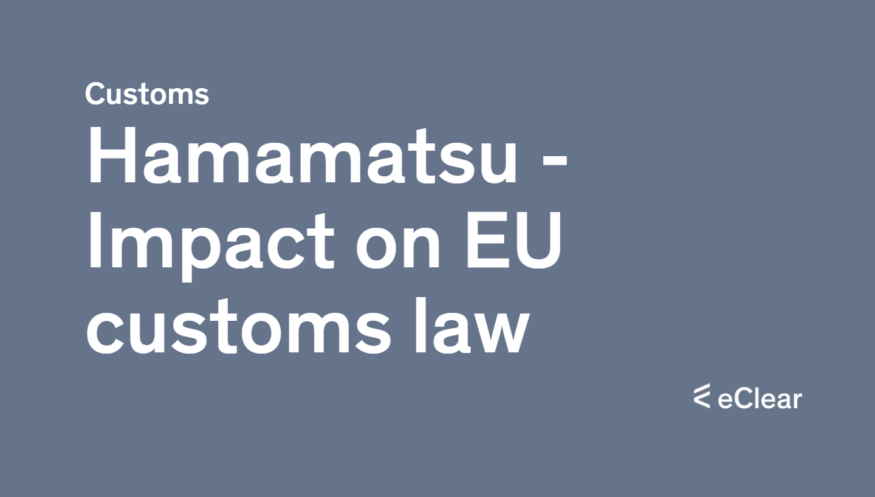In its ruling of 17 May 2022 (published on 29 September 2022), the Federal Fiscal Court (Bundesfinanzhof, BFH) in the case VII R 2/19 “Hamamatsu” dismissed the appeal against an application for a refund of customs duties and at the same time made some fundamental findings that may have a significant impact on the future assessment of transactions between affiliated group companies under customs value law.
The “Hamamatsu case” concerned the German subsidiary of a Japanese parent company that used the sales price to determine the transaction value of its imported goods in the customs value declaration. It was agreed between the group companies and with the German tax authorities (without the involvement of the customs administration) under an Advance Pricing Agreement (APA) that the intra-group transfer price would be determined based on the “residual profit sharing method”. Accordingly, equalisation payments were made at the end of each financial year, which were either credited to or debited from the German company. The dispute was based on a situation where the German subsidiary received retroactive lump-sum price reductions. These led to an application for a refund of customs duties due to a retroactive reduction of the declared import customs values.
The Fiscal Court ultimately rejected the refund based on the ECJ ruling of 20 December 2017 in case C-529/16. It attracted a great deal of attention in the customs world. The applicant appealed against the decision of the Tax Court – this has now also been rejected.
The Court took the general position that retroactive price adjustments, i.e. even if they are made outside the implementation of an APA based on the application of a compensatory transfer pricing mechanism, “have no impact on the final customs value”; this is due to the unclear effects in terms of amount and impact at the time of importation. This statement by the Court could be explosive, as it would also preclude the subsequent levying of customs duties.
In the present case, the customs administration was not aware at the time of importation that price adjustments would be applied retroactively. Whether this means that the assessment would be different in the case of a prior agreement with the customs administration remains to be seen. However, since even in the case of a previous agreement that retroactive compensation would be made, the uncertainty about the amount of the compensation payment and whether an upward or downward adjustment would be made remains, a different assessment in such a case is to be regarded as unlikely.
In this context, the following fundamental findings of the Federal Fiscal Court should be mentioned:
The transaction value method, i.e. the determination of the customs value based on the invoice amount, is excluded in such cases where the value of the imported goods cannot be determined at the time of importation, as this value is composed of the invoice amount and a flat-rate adjustment which cannot be determined at the time of importation. Therefore, this view is based on the above-mentioned ECJ ruling and is not new.
The so-called standard method for determining the customs value is excluded in this case for the same reasons: “It follows that the ECJ’s ruling that the Customs Code does not allow an agreed transaction value to be used as the basis for calculating the customs value if that transaction value consists partly of an amount originally invoiced and reported and partly of a lump-sum adjustment after the end of the accounting period, without it being apparent whether that adjustment is upward or downward at the end of the accounting period, ultimately also governs the determination of the customs value using the fall-back method under Art. 31 of the Customs Code.” (Judgment, para. 49).
In the opinion of the Federal Fiscal Court, retroactive price adjustments are irrelevant for the determination of the customs value: “At least in the context of all customs valuation procedures, such a transfer pricing adjustment, which serves as an income tax instrument to avoid disputes and reduce transfer pricing risks (cf. Liebchen in Mössner et al., Steuerrecht international tätiger Unternehmen, 5th ed., para. 13.50; cf. also Drüen in Wassermeyer MA Art. 25 MK, para. 110), has – due to the demonstrable commodity- and reference date-related nature of the customs valuation – no influence on the final customs value.” (Judgment, para. 59).
The above statement refers not only to retroactive downward adjustments but, according to the Federal Fiscal Court, explicitly also to upward adjustments. This has the consequence that retroactive price increases that would increase the customs value must also be disregarded.
At the same time, it must be emphasised that the rulings of the Federal Fiscal Court – unlike those of the European Court of Justice (ECJ) – naturally have no direct effect on the European Union as a whole. Nevertheless, it remains exciting to observe the future impact of these rulings, which affect EU-wide customs valuation law (and, in the primary, customs valuation law practically worldwide).
Source: wts.com/global/







